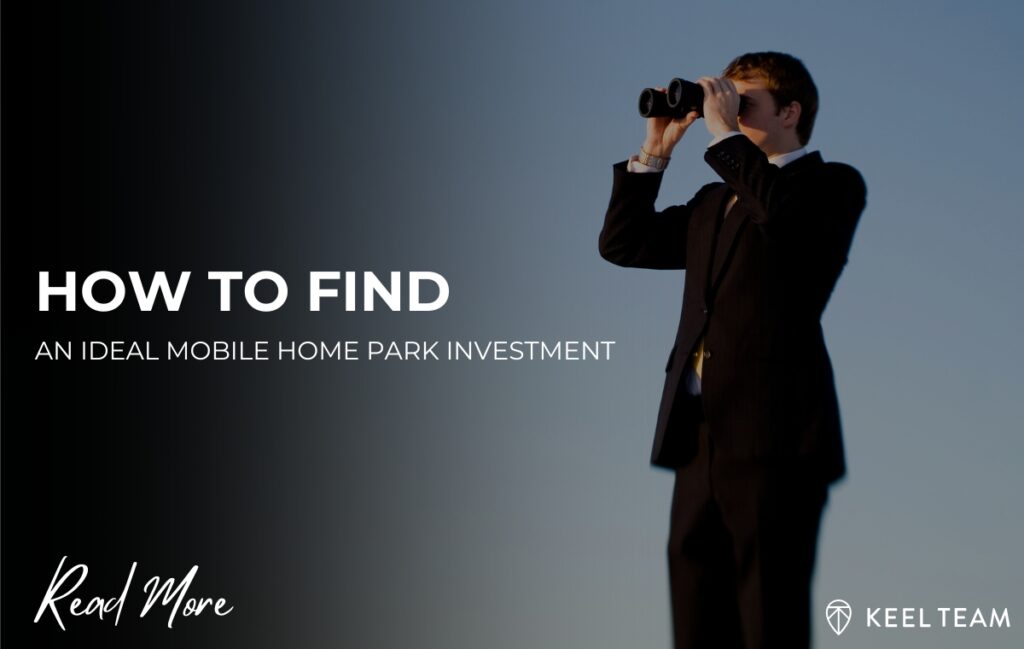How to Find an Ideal Mobile Home Park Investment
-
 Tristan Hunter - Investor Relations
Tristan Hunter - Investor Relations

Introduction
Choosing the right mobile home park investment can feel like finding the perfect partner. Both require a clear understanding of what you’re looking for and the criteria that will help you recognize “the one” when you find it. This article will guide you through the essential considerations for selecting a mobile home park investment, based on our strategies at Keel Team. Keep in mind that these are guidelines meant for educational purposes and should be customized to fit your unique circumstances, needs, resources, and experience level.
Key Market Considerations
In real estate, “location, location, location” is a well-known mantra. However, for mobile home park investments, the focus shifts slightly. The critical factor is the demand for affordable housing in a market that supports ample employers, tenants, and contractors to help you achieve your business goals.
The Midwest Advantage
The Midwest often presents some of the best opportunities for mobile home park investments, with generally higher purchase cap rates and more spread in deals.
Pros:
- Larger spreads and upside potential.
- Solid demand for affordable housing.
- There are many mismanaged mobile home parks, offering value-add opportunities.
Cons:
- Mismanaged trailer parks require more work.
- Harsh winters necessitate systems for snow plowing, winterizing homes, and managing underground water leaks.
- Higher exit cap rates in this region.
Opportunities in the Southeast
The Southeast also typically offers numerous opportunities with generally higher-quality trailer parks and strong resale demand.
Pros:
- Decent spreads in good deals.
- Many solid metro areas.
- High resale demand.
Cons:
- Fewer good deals are available.
- Coastal markets risk natural disasters (we avoid these).
- Some markets have low demand for affordable housing.
Looking for more resources? Watch “Smart ways to improve your mobile home community” – presented by CEO of Keel Team, Andrew Keel.
Evaluating Metro and City Populations
When assessing cities and metro areas, look for markets with strong demand for affordable housing and sufficient employers, tenants, and contractors to support your business plan.
Minimum City Population
We prefer cities with a population of at least 40,000 people. This helps ensure a sufficient tenant base to fill vacant homes and a good pool of contractors for construction projects. A smaller city population can limit your tenant and contractor options, making it challenging to execute your business plan effectively.
Metro Area Population Considerations
Ideally, the metro area population should be at least 100,000 people. This generally provides a larger pool of potential tenants and contractors. If the city population is below 40,000, the deal might still work if the metro population is close to or exceeds 1,000,000 people or if other areas of the investment are attractive. Proximity to the metro is important; being within an hour’s drive can make a significant difference.

Types of Mobile Home Parks
All-aged vs. Senior Mobile Home Parks
Mobile home parks typically cater to either all-age tenants (no age restriction) or senior tenants (55+). Both types can be viable investments.
- All-aged Mobile Home Parks: Generally, more diverse tenant base but potentially higher turnover and delinquencies.
- Senior Mobile Home Parks: Often have fewer delinquencies and better-maintained properties but stricter age restrictions and more tenant communication needs.
Affordable Housing vs. Premium Mobile Home Parks
Mobile home parks are rated on a five-star system, with one-star being very low quality and five-star being top-tier. We focus on affordable trailer parks, in the two- to three-star range, where lot rents are around $300 a month, sometimes lower.
- Affordable Housing Trailer Parks: Lower initial costs and more value-add opportunities.
- Four- and Five-Star Mobile Home Parks: Higher quality and amenities but often overpriced with little upside.
Assessing Housing Demand
Comparing Apartment Rents
We look for a 1.5x spread between mobile home park rental costs and comparable apartment rents. For example, if renting a park-owned home costs $550 per month ($300 lot rent + $250 home rent), comparable apartments should rent for at least $825 in that market.
Single-Family Home Comparisons
We also compare single-family home rentals, applying the same 1.5x multiplier. Additionally, we prefer markets where the median house price is $100,000 or more, indicating a significant step up from mobile home park rents.
Testing Market Demand
Running test ads on platforms like Facebook Marketplace, Zillow, and Craigslist helps gauge demand. If you receive more than three calls a day from these ads, it’s a good indicator of strong demand for affordable housing.
Basic Mobile Home Park Investment Requirements
Ideal Number of Sites
We prefer mobile home parks with more than 50 lots, ideally between 50-100. Managing smaller trailer parks can be as time-consuming as managing larger ones, but larger mobile home parks typically offer significantly higher profits and upside.
Occupancy Rates
We like value-add deals, often with occupancy below stabilized levels (typically 70-80%). Stabilized trailer parks offer better loan terms but less upside potential. We balance occupancy with the potential for value-add opportunities.

Park-Owned vs. Tenant-Owned Homes
Our preference is for 100% tenant-owned homes (TOHs) by the time we refinance, which generally require less management and have less tenant turnover. Lenders also share a similar belief. However, we will consider trailer parks with a higher percentage of park-owned homes (POHs) if the price is right and we can transition POHs to TOHs over time.
Utilities and Infrastructure
Public vs. Private Utilities
We prefer mobile home parks with public utilities, but we will consider a property that has at least one public and one private utility system. More complex systems, like lagoons or packaging plants, come with higher risks and repair costs. We generally avoid these.
Financial Considerations
Your financial capabilities will dictate your investment criteria. Consider your available cash, investor resources, credit, and net worth when evaluating potential deals. We syndicate our investments by gearing local credit union financing (typically 75% LTV) and private investor equity to purchase our properties. Once stabilized, we then look to refinance with agency debt (at around 60% LTV) and hold the properties long-term, meaning our investors remain in the deal.
Understanding Cap Rates
Cap rates vary by market and investor needs. We typically look to stabilize our properties at around a 10% cap rate or higher, usually purchasing them from about 5-8% cap rates. We are however flexible based on financing terms and market conditions.
Evaluating Cash-on-Cash Return
We aim for a minimum 15% cash-on-cash return for our investors, adjusting for financing terms and other factors. We usually structure this with a 10% preferred return which is distributed quarterly to our investors, with the rest of the upside typically coming from the cash-out refinancing proceeds.
Conclusion
Creating detailed, specific criteria tailored to mobile home park investments helps identify the right opportunities. While these guidelines can help, your criteria should reflect your unique circumstances, needs, and experience level. By doing thorough research and planning, you can increase your chances of finding profitable mobile home park investments.
Get in touch below to explore more insights into our investment strategy and how we’ve turned around 30+ assets out of a portfolio of 45+ mobile home parks currently under management.
Learn more about mobile home park investing.
Interested in learning more about mobile home park investing? Get in touch with us today to find out more.
Disclaimer:
The information provided is for informational purposes only and is not investment advice or a guarantee of any kind. We do not guarantee profitability. Make investment decisions based on your own research and consult registered financial and legal professionals. We are not registered financial or legal professionals and do not provide personalized investment recommendations.

Tristan Hunter - Investor Relations
View The Previous or Next Post
Subscribe Below 👇





